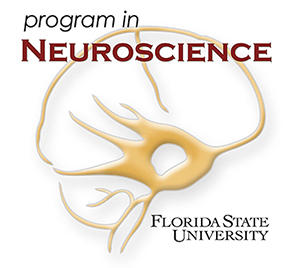FSU Program in Neuroscience welcomes returning alumni for 2015 Rushton Lectures

Florida State University’s Program in Neuroscience presents the 2015 Rushton Lectures, featuring presentations from eight outstanding FSU alumni who have achieved notable success in their early careers with new faculty positions, executive positions in research-related companies or significant grant funding.
The day’s events — titled “FSU Neuroscience: A Celebration of Excellence” — are free and open to the public, and will take place:
SUNDAY, JAN. 25
9 A.M. – 4:45 P.M.
PSYCHOLOGY BUILDING AUDITORIUM
1107 W. CALL ST.
FLORIDA STATE UNIVERSITY CAMPUS
The full day’s lineup is as follows:
8 – 9 a.m.
Breakfast
Psychology Building Atrium and A-204
9 – 9:15 a.m.
Welcome and Introduction
Dr. Frank Johnson, Director, FSU Program in Neuroscience; Dr. Robert Contreras, Associate Dean of Arts and Sciences; and Dr. Zuoxin Wang, Rushton Lectures Committee Chair
9:15 – 9:55 a.m.
Dr. Chad Samuelsen — Stony Brook University: State University of New York
“Cortical Integration of Anticipatory, Gustatory and Olfactory Signals”
Samuelsen studies the multisensory processing of taste in alert animals. Taste is an inherently multimodal sensation, including anticipatory environmental cues and multiple sensory modalities during consumption. He investigates how populations of cortical neurons integrate the multisensory and psychological dimensions of taste and smell.
9:55 a.m. – 10:35 a.m.
Dr. Christie Fowler — University of California, Irvine
“Neural Circuits Mediating Reward and Aversion in Nicotine Addiction”
Fowler studies the neurobiological mechanisms underlying motivated behaviors that drive addiction. Current research utilizes in vivo neuromodulation and genetic manipulation to characterize brain circuitry and signaling mechanisms mediating aversive effects of nicotine that control intake of the drug and may provide novel targets for smoking-cessation therapeutics.
10:35 – 10:50 a.m.
Break
10:50 a.m. – 11:30 a.m.
Dr. Jessica Brann — Loyola University Chicago
“Fountain of Youth? Probing the 'Age' of Neural Stem Cells”
Regeneration of neurons is rare, but could have profound therapeutic impact on recovery from trauma or pathological brain injuries. Brann studies neural stem cell differentiation and functional regeneration in the olfactory system, which houses two repositories of neural stem cells capable of lifelong proliferation in the face of an ever-changing sensory landscape.
11:30 a.m. – 12:10 p.m.
Dr. David Dietz — Buffalo University: State University of New York at Buffalo
“The Addicted Synapse: Mechanism of Synaptic Plasticity”
Drug addiction is marked by long-lasting changes in behavior that persist despite prolonged abstinence. Dietz studies the molecular and behavioral mechanisms that underlie psychiatric disorders and is particularly interested in understanding how drugs of abuse “rewire” the reward center of the brain- leading to a life-long battle with addiction.
12:10 – 1:30 p.m.
Lunch
Psychology Building Atrium and A-204
1:30 – 2:10 p.m.
Dr. Angie Cason — Medical University of South Carolina
“Hypothalamic Orexin and Conditioned Food Seeking”
Cason’s studies orexin action within the brain reward circuitry to modulate the rewarding value of food and drugs of abuse. Both activate similar brain pathways, including the mesolimbic dopamine and orexin systems, which influence the development of obesity and drug addiction. This research will lead to new treatment options for these disorders.
2:10 – 2:50 p.m.
Dr. Eric Krause — University of Florida
“Osmotic Dehydration Reveals Oxytocinergic Circuits that Dampen Stress Responsiveness and Promote Social Behavior”
Krause uses a rodent model to investigate how the central nervous system coordinates behavioral and physiological responses to stress. In particular, he investigates how different states of dehydration impact the neural circuits regulating stress-responding and the development of psychopathology and cardiovascular disease.
2:50 – 3:05 p.m.
Break
3:05 – 3:25 p.m.
Dr. Alexander Nicholas — The Lemelson Foundation
“Re-Imagining the Role of a Scientist in Society”
Nicholas works to promote economic growth in the US, and social and economic progress for the poor in developing countries including Indonesia, India and Malawi. A key portion of his work includes enabling universities around the world to support an emerging generation of young scientists to launch ventures that improve life for people and the planet.
3:25 – 3:45 p.m.
Dr. Brandy Wilkinson — Champions Oncology Inc.
“PDX Models for Improved Translational Research and Preclinical Prediction”
Wilkinson’s work involves development of Patient Derived Xenograft platforms for growing tumor tissue from specific patients, empowering patients, physicians and oncology drug developers with test tissue for predicting a patients’ clinical response to cancer treatments. The goal is to accelerate oncology drug development, improve patient outcomes, and extend lives.
3:45 – 4:40 p.m.
Open Forum Discussion
NS Training and Careers: Moderator, Dr. Cathy Levenson, Drs. Alexander Nicholas and Brandy Wilkinson with all other speakers.
4:40 – 4:45 p.m.
Closing Remarks
Dr. Mike Meredith, Rushton Committee
6:30 p.m.
Post-Symposium Reception and Dinner
FSU Alumni Center, 1030 W. Tennessee St.
The Rushton Lecture Series is named for neuroscientist W.A.H. Rushton, who is renowned for his work in neuronal excitation and vision. Professor Rushton held the position of Distinguished Research Professor at FSU from 1968 to 1976, following his “first” retirement from the faculty at the University of Cambridge. The lecture series features presentations by prominent neuroscientists on contemporary topics. Formal and informal interactions with these internationally recognized experts are an important part of the Neuroscience Program's graduate training mission and the series enriches the academic environment at Florida State University.
For more information about the 2015 Rushton Lectures, contact Professor Mike Meredith at (850) 644-3427 or mmered@neuro.fsu.edu.

